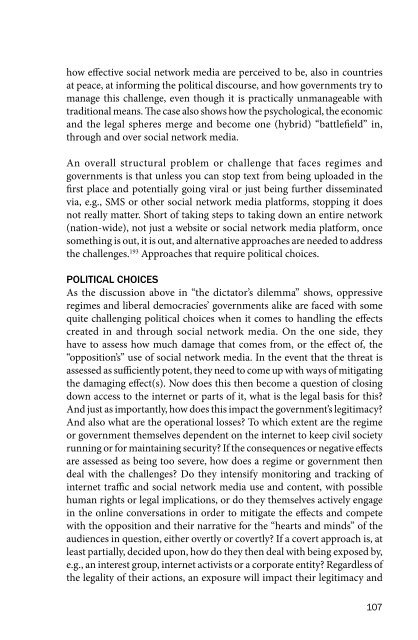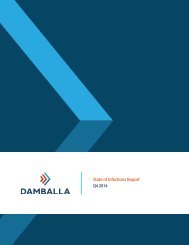The Weaponization of Social Media
The Weaponization of Social Media
The Weaponization of Social Media
Create successful ePaper yourself
Turn your PDF publications into a flip-book with our unique Google optimized e-Paper software.
how effective social network media are perceived to be, also in countries<br />
at peace, at informing the political discourse, and how governments try to<br />
manage this challenge, even though it is practically unmanageable with<br />
traditional means. <strong>The</strong> case also shows how the psychological, the economic<br />
and the legal spheres merge and become one (hybrid) “battlefield” in,<br />
through and over social network media.<br />
An overall structural problem or challenge that faces regimes and<br />
governments is that unless you can stop text from being uploaded in the<br />
first place and potentially going viral or just being further disseminated<br />
via, e.g., SMS or other social network media platforms, stopping it does<br />
not really matter. Short <strong>of</strong> taking steps to taking down an entire network<br />
(nation-wide), not just a website or social network media platform, once<br />
something is out, it is out, and alternative approaches are needed to address<br />
the challenges. 193 Approaches that require political choices.<br />
POLITICAL CHOICES<br />
As the discussion above in “the dictator’s dilemma” shows, oppressive<br />
regimes and liberal democracies’ governments alike are faced with some<br />
quite challenging political choices when it comes to handling the effects<br />
created in and through social network media. On the one side, they<br />
have to assess how much damage that comes from, or the effect <strong>of</strong>, the<br />
“opposition’s” use <strong>of</strong> social network media. In the event that the threat is<br />
assessed as sufficiently potent, they need to come up with ways <strong>of</strong> mitigating<br />
the damaging effect(s). Now does this then become a question <strong>of</strong> closing<br />
down access to the internet or parts <strong>of</strong> it, what is the legal basis for this?<br />
And just as importantly, how does this impact the government’s legitimacy?<br />
And also what are the operational losses? To which extent are the regime<br />
or government themselves dependent on the internet to keep civil society<br />
running or for maintaining security? If the consequences or negative effects<br />
are assessed as being too severe, how does a regime or government then<br />
deal with the challenges? Do they intensify monitoring and tracking <strong>of</strong><br />
internet traffic and social network media use and content, with possible<br />
human rights or legal implications, or do they themselves actively engage<br />
in the online conversations in order to mitigate the effects and compete<br />
with the opposition and their narrative for the “hearts and minds” <strong>of</strong> the<br />
audiences in question, either overtly or covertly? If a covert approach is, at<br />
least partially, decided upon, how do they then deal with being exposed by,<br />
e.g., an interest group, internet activists or a corporate entity? Regardless <strong>of</strong><br />
the legality <strong>of</strong> their actions, an exposure will impact their legitimacy and<br />
107



